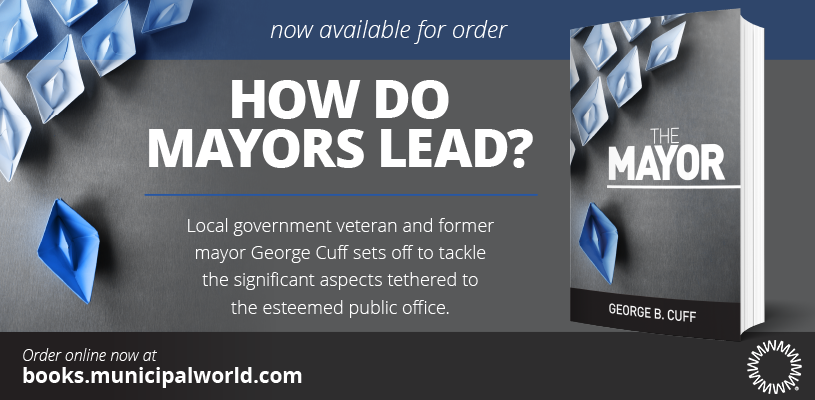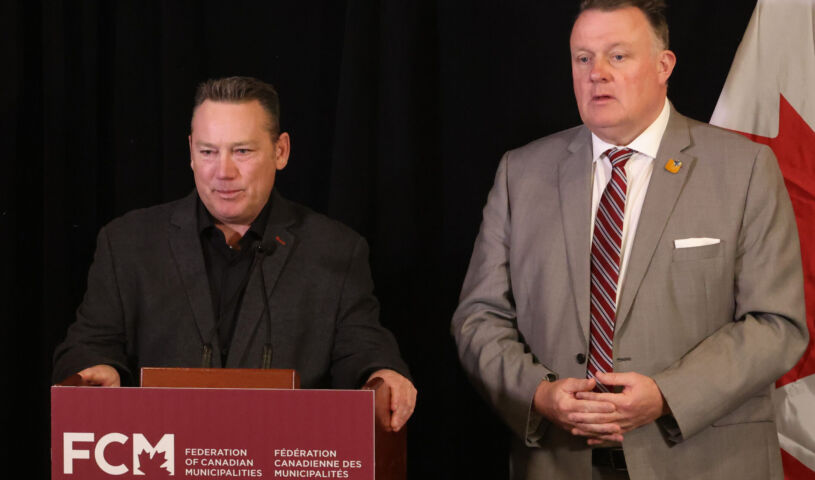N.L. municipalities working for better fiscal stability
 Municipalities across Newfoundland and Labrador faced the same challenges as their counterparts across the country in 2023. But Municipalities Newfoundland & Labrador CEO Rob Nolan said they also had to deal with obstacles that were more unique to their realities. Photo: Rob Nolan
Municipalities across Newfoundland and Labrador faced the same challenges as their counterparts across the country in 2023. But Municipalities Newfoundland & Labrador CEO Rob Nolan said they also had to deal with obstacles that were more unique to their realities. Photo: Rob Nolan
Municipalities across Newfoundland and Labrador faced the same challenges as their counterparts across the country in 2023. But they also had to deal with obstacles that were more unique to their realities.
That said, there were some real accomplishments as well. And not just for municipalities, but the organization that represents their interests as well. Municipalities Newfoundland & Labrador (MNL) was formed in 1951. Their current CEO just finished his first full year on the job in 2023.
Rob Nolan was hired in December 2022. He sees 2023 as having been “an exciting year” for himself and a strong year for MNL. A significant accomplishment in 2023 saw MNL complete a strategic plan that was later approved by the board.
Nolan said having that plan in place has been key for MNL, which is made up of “small but mighty team” of just seven people. Being more strategic about their work, Nolan said, has helped guide MNL’s efforts.
Fiscal Stability Struggles
Those efforts saw attention paid to many challenges in 2023. But none were more pervasive as affordability.
Inflation is hitting municipalities hard across Newfoundland and Labrador. It is such an issue that out of 11 member resolutions passed by delegates at MNL’s annual general meeting (AGM) last fall, nine dealt with fiscal stability issues.
“That tells you where the minds of our members are,” Nolan said. “That’s been a conversation that we’ve been having for a few years now, many years, around fiscal framework and fiscal stability.”
Nolan is quick to applaud the efforts of the Federation of Canadian Municipalities (FCM) for leading the charge on fiscal stability. It’s been an issue for years, but Nolan said the problem has become “particularly acute right now.”
Support for Fire Services
A problem more unique to Newfoundland and Labrador is the cost of fire services. Fire departments fall under municipal umbrellas in Newfoundland and Labrador, like many provinces across the country. And of course, costs have gone up dramatically.
Unfortunately, more and more departments across the province are responding to incidents outside of municipal boundaries.
There is a framework that sees a flat rate paid to a volunteer or municipal fire department when it goes outside of its community boundaries. For more than a decade, that fee has been steady at $350 for three hours per event. But as one can imagine, the costs of fire service have gone up considerably over those 10 years.
With that in mind, and looking back to last year’s AGM, three of those 11 member resolutions were related to supporting fire departments.
“That also shows that volunteer fire departments in particular, but fire departments in general, and their municipal councils don’t always see eye to eye,” Nolan said. “Councils recognize that if the province doesn’t support fire departments more, then that falls to municipalities, and they just don’t have the extra wiggle room there. So that’s a significant conversation for us right now around fiscal stability.”
Housing, Infrastructure, and Climate Change
The question of fiscal stability has been somewhat ubiquitous. But another big concern for MNL members is around housing and homelessness.
Historically, Nolan said, homelessness has been viewed as more of an urban issue. In Newfoundland and Labrador, St. John’s is the largest city. As such, housing and homelessness has been largely viewed as a St. John’s centric issue.
That conversation has changed over the last few years. The housing crisis is being seen and identified by municipalities right across the spectrum. People are recognizing that homelessness is in every community, Nolan said. It might be hidden homelessness, but it’s something that’s a problem in communities of all sizes.
Infrastructure issues are right across the province as well. Nolan said the situation is particularly acute in the smaller municipalities. Nolan puts “smaller municipalities” into context. Seventy-five per cent of the 274 municipalities in Newfoundland and Labrador have fewer than 1,000 residents. MNL’s urban municipalities caucus comprises the remaining 23 municipalities that have populations of 3,000 or more.
But there are more than 500 communities when you include local service districts and unincorporated areas. Altogether, half a million people live in the province.
There are coastal communities, northern communities, and remote communities. As such, the province’s geography has municipalities facing the climate crisis head on.
“It’s our local governments that are facing them in the front lines,” Nolan said. “Capacity isn’t going up for those communities, but they are working together. I think there’s a sense of optimism, but it is facing great challenges in the sector across the province.”
Facing Difficult Obstacles
While the scope of the obstacles seems insurmountable, Nolan said he is optimistic that solutions can be found. He acknowledges the provincial government is in a difficult position economically. At the same time, MNL is getting pushback on their advocacy efforts.
Still, he does feel that municipalities are being heard.
“I think they’re hearing us, and since FCM is leading the charge so much as well, the feds are engaged in that conversation more, too,” Nolan said. “Housing and climate change are two kind of crises that are interacting with each other and interacting with the infrastructure crisis as well. Our lenses into that are for the feds in particular, but I think what we’re seeing with the provincial government those are also avenues to see action.”
Issues around infrastructure, housing, and of course fiscal stability were big topics in 2023. But unfortunately, they aren’t going away anytime soon. And so, Nolan said they will continue to be areas where MNL will focus it advocacy efforts.
Of course, they aren’t the only topics that will garner MNL’s attention.
Like other municipal organizations across the country, Nolan said MNL is currently well into their pre-budget advocacy. He said they will also be “leaning into the conversation” around fire services and working closely with the Newfoundland and Labrador Association for Fire Services.
On the topic of housing, Nolan said there are many organizations that have been working in the housing space for a long time. There are also new organizations that are popping up to respond to the crisis.
As such, MNL is uniquely positioned to act as a convener in that space and bring municipalities to the table. That, Nolan said, is a real opportunity for MNL to act in that space in 2024.
State of Local Government
Nolan is a passionate advocate for municipal affairs and governance. His career has provided him with many opportunities to work in the local government sphere.
For example, Nolan co-founded the municipal advocacy group Citizens’ Assembly for Stronger Elections in 2017. He’s also managed and advised on multiple municipal campaigns.
Given his background, it isn’t surprising that he would be concerned about the state of local government today.
“There’s a lot to be done. I think as conveners, it’s really helpful. That’s what I’ve seen over the last year,” Nolan said. “Being able to bring municipal leaders and administrators together to talk about the big challenges and come up with common solutions. That is incredibly valuable and not something that’s just happening organically necessarily. So that’s a real place for us to play a role.” MW
✯ Municipal World Executive and Essentials Plus Members: You might also be interested in Meyer’s article: National strategy invests in municipal resiliency.
Sean Meyer is Digital Content Editor for Municipal World.
Related resource materials:



